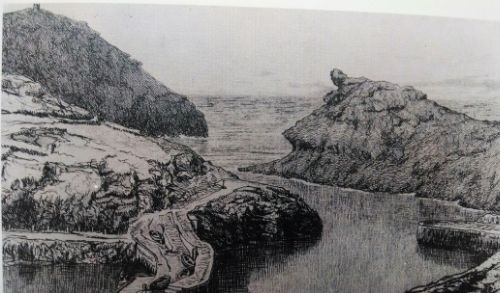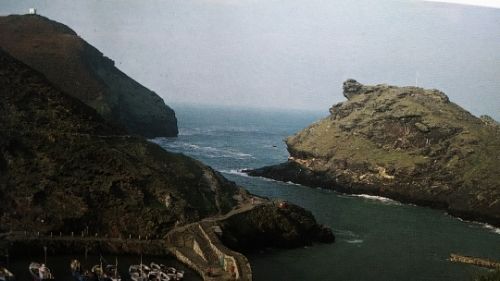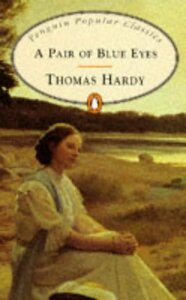You need to sign in or sign up before continuing.
Take a photo of a barcode or cover
A Pair of Blue Eyes' claim to fame is that it is the book that brought us the term "cliffhanger". It was first published as a serialized novel, and one of the chapters ends with a man literally dangling off the edge of a remote cliff with no trees or rope in sight as a rescue aid and his only hope the brawn of his young woman companion.
The book features a love triangle between the wishy-washy Elfride, the douchebag Mr. Knight, and the doe-eyed Stephen. I'm not sure any reader would hope Elfride would match up with either of them. Both men endure her love-you-love-you-not abuses. Everyone tries to change to be something that they're not or to like something different than their ideal in order to pretend a perfect love match. This is supposedly Hardy's most autobiographical book, so I wonder if he was commenting on not really having anything in common with his first wife or if the autobiographical bit was just the problem of not being in the same social strata as his first wife was.
I would have given the book 2 stars except for 2 things: the cliffhanger scene and the satisfying ending. I loved the
This is a picture of the area around Boscastle (disguised as Castle Boterel in the book). This drawing was the frontispiece of the 1895 edition of A Pair of Blue Eyes

which corresponds to this photograph:

I assume that the cliff on the left side of the photo is the one from which Mr. Knight was depended.
Hardy courted his first wife at Boscastle, and it still exists today for tours: http://www.cornwall-online.co.uk/north-cornwall/boscastle.htm
Additionally, here's a nice tourist video of the area: https://www.youtube.com/watch?feature=player_embedded&v=cFxRurrS2kk
The Boscastle House Bed & Breakfast tempts me even more to holiday there some day: http://boscastlehouse.co.uk
This is one of the weaker of Thomas Hardy's books. I'm happy to be reading a more popular one next on my personal challenge to read them all.
The book features a love triangle between the wishy-washy Elfride, the douchebag Mr. Knight, and the doe-eyed Stephen. I'm not sure any reader would hope Elfride would match up with either of them. Both men endure her love-you-love-you-not abuses. Everyone tries to change to be something that they're not or to like something different than their ideal in order to pretend a perfect love match. This is supposedly Hardy's most autobiographical book, so I wonder if he was commenting on not really having anything in common with his first wife or if the autobiographical bit was just the problem of not being in the same social strata as his first wife was.
I would have given the book 2 stars except for 2 things: the cliffhanger scene and the satisfying ending. I loved the
Spoiler
part where Knight and Stephen realize that they had both been in love with Elfride and race to reclaim her only to find that she's dead. It was my great pleasure to find that she was dead and that their love prospects had been ruined. How horrible of me.This is a picture of the area around Boscastle (disguised as Castle Boterel in the book). This drawing was the frontispiece of the 1895 edition of A Pair of Blue Eyes

which corresponds to this photograph:

I assume that the cliff on the left side of the photo is the one from which Mr. Knight was depended.
Hardy courted his first wife at Boscastle, and it still exists today for tours: http://www.cornwall-online.co.uk/north-cornwall/boscastle.htm
Additionally, here's a nice tourist video of the area: https://www.youtube.com/watch?feature=player_embedded&v=cFxRurrS2kk
The Boscastle House Bed & Breakfast tempts me even more to holiday there some day: http://boscastlehouse.co.uk
This is one of the weaker of Thomas Hardy's books. I'm happy to be reading a more popular one next on my personal challenge to read them all.
A Pair of Blue Eyes is a first read for me and I was stunned at how big a story this is …I think it is only because Tess, Mayor of C, Jude and Far from are so immense that this is overshadowed. It is the story of Elfride a young girl living with her Vicar Father. The church needs renovations and an architect’s assistant - Stephen - comes up from London to check out what is needed. A relationship blossoms between them somewhat speedily. Elfride is young, naive and a trifle coquettish, in love with love one suspects rather than Stephen. The Vicar is obsessed with social mobility and Stephen does not tick his boxes. Stephen disappears to make his fortune..and Knight arrives and Elfride’s affections are diverted…
Oh my goodness I am so happy to be with Hardy again..Everything that I love about his writing is here in abundance - the gorgeous descriptions, epic scenery, social observation and brilliantly drawn characters. And Hardy’s fatalism which sprinkles little codes through the story - a letter not read, a letter discovered, a chance sighting..stories in Hardy’s world switch so perilously on the whim of a capricious fate. One epic scene in this story sees Elfride sitting on a tomb which houses a former love; it is where she sat with Stephen and now sits with Knight…and added to this the chance discovery of an earring with huge significance..
In the first half of the story I struggled to like Elfie - she was so young and rather frivolous and a bit vain. She switches her affection to Knight rather easily..and then suddenly this beautiful, warm hearted girl really becomes a victim of a rather shallow and self-centred man who cannot accept that she has loved anyone before him. His psychological treatment of her is nothing short of cruel. And the story becomes desperately uncomfortable and I felt so sorry for judging her in the first half…
For me Blue Eyes had so many parallels with Tess of the D’Urbervilles which really excited me…I felt that the relationship between knight and Elfie is amplified in that of Angel Clare and Tess; the social climbing, significant letters, and the desperate treatment of women
Неласкав за жените, неласкав за мъжете в книгата си, Томас Харди както винаги действа безпощадно с героите си. Реалист до мозъка на костите си, но същевременно достатъчно деликатен, че майсторски да разкрива пред всички ни красивия идеализъм на романтизма и душевните висини, до които той въздига духа ни.
Това е четвъртата негова книга, която чета (след „Кметът на Кастърбридж“, „Далече от безумната тълпа“, „Тес от рода Д'Ърбървил“ - единствено последната изобщо не ми хареса, дотолкова, че вече съм забравила какво се случваше там. Останалите две са сред любимите ми романи).
„Две сини очи“ е крайно необичаен и интересен заради отношенията между тримата в любовния триъгълник. Смятам, че драматизмът е изграден чудесно (макар критиците да не го били харесали чак толкова много). Жалкото за мен е единствено, че главната героиня, Елфрайд, не ми допадна особено като характер и личност, а това винаги ми предизвиква известно неудобство, когато оценявам самия роман като страхотен. Хенри Найт и Стивън Смит поне имаха някаква сила на характера, а Елфрайд бе представена като прекалено крехка и чувствителна, жена, която сама е предпочела да е слугиня на силния, вместо да властва над невежия. Твърде наивна поради неопитност. От една страна, романтичката в мен харесва това, но феминистката - не особено. Липсата на опит е определяща, но все пак интелигентният човек има инстинкти, от които да се води. Но самият Харди също е феминист, който напълно отрича викторианското робство и предразсъдъци, в които са принудени да живеят жените. Освен това е толкова суров и с Найт, и със Стивън, дори и с бащата на Елфрайд, че всъщност няма за какво толкова да му се сърдя.
Този писател безспорно е умеел да разбира много добре половете и техните представи, особености, силни и слаби страни, което за мен е страхотно, защото такива хора като цяло са рядкост.
Ето и няколко цитата, заради които толкова го харесвам:
„Любовта често умира с времето – но много по-често умира, защото идва някой друг.“
„Постоянната любезност е по-скоро недостатък, отколкото способност. Тя говори, че човек няма достатъчно усет да разбере кого презира.“
„Всичко се свежда до едно-единствено просто нещо: преди никога не те бях виждал и не те обичах; после те видях и те обикнах.“
Това е четвъртата негова книга, която чета (след „Кметът на Кастърбридж“, „Далече от безумната тълпа“, „Тес от рода Д'Ърбървил“ - единствено последната изобщо не ми хареса, дотолкова, че вече съм забравила какво се случваше там. Останалите две са сред любимите ми романи).
„Две сини очи“ е крайно необичаен и интересен заради отношенията между тримата в любовния триъгълник. Смятам, че драматизмът е изграден чудесно (макар критиците да не го били харесали чак толкова много). Жалкото за мен е единствено, че главната героиня, Елфрайд, не ми допадна особено като характер и личност, а това винаги ми предизвиква известно неудобство, когато оценявам самия роман като страхотен. Хенри Найт и Стивън Смит поне имаха някаква сила на характера, а Елфрайд бе представена като прекалено крехка и чувствителна, жена, която сама е предпочела да е слугиня на силния, вместо да властва над невежия. Твърде наивна поради неопитност. От една страна, романтичката в мен харесва това, но феминистката - не особено. Липсата на опит е определяща, но все пак интелигентният човек има инстинкти, от които да се води. Но самият Харди също е феминист, който напълно отрича викторианското робство и предразсъдъци, в които са принудени да живеят жените. Освен това е толкова суров и с Найт, и със Стивън, дори и с бащата на Елфрайд, че всъщност няма за какво толкова да му се сърдя.
Този писател безспорно е умеел да разбира много добре половете и техните представи, особености, силни и слаби страни, което за мен е страхотно, защото такива хора като цяло са рядкост.
Ето и няколко цитата, заради които толкова го харесвам:
„Любовта често умира с времето – но много по-често умира, защото идва някой друг.“
„Постоянната любезност е по-скоро недостатък, отколкото способност. Тя говори, че човек няма достатъчно усет да разбере кого презира.“
„Всичко се свежда до едно-единствено просто нещо: преди никога не те бях виждал и не те обичах; после те видях и те обикнах.“
Doi ochi albaștri este un roman care a început bine, dar mi-a fost foarte greu să-l termin. Deși mi-a plăcut ideea unui triunghi amoros, în ultima treime a cărții lucrurile au început să se complice fără niciun motiv. Personajele, pe care nu am reușit să le îndrăgesc din cauza trăsăturilor exagerate, mi s-au părut toate infantile în deciziile luate. Recenzia o găsiți pe blog.
I really enjoyed this one. The story is fairly simple but I like how it’s constructed and of course it’s beautifully written. Hardy is good at showing all the silly class distinctions even in a time when class mobility is becoming more possible for men like architect Stephen. I knew that Stephen and Elfride were doomed not to be together(it’s Hardy!) but her father has wasted all his first wife’s money, then marries a woman 20yrs older than him for her money and property and that’s perfectly reasonable!, made me laugh anyway. Set in Cornwall, the scenery is used in such a brilliant way (literal cliffhanger!) and the old church tower was always an ominous building. The creepy Mrs Jethway, Stephen’s parents and some of the other side characters are all used to good effect. The ending is perfectly tragic as expected.
emotional
reflective
slow-paced
emotional
reflective
sad
slow-paced
Plot or Character Driven:
A mix
Strong character development:
No
Loveable characters:
No
Diverse cast of characters:
No
Flaws of characters a main focus:
Yes
I had a really hard time with this book. The only reason I pushed through is because it's a classic and I hadn't read Thomas Hardy before. The storyline is interesting to a degree, but it more served to show me how good I have it as a woman in 2017. I didn't fall in love with the writing, but I liked Knight, Stephen, and Elfride. I felt bad for all three of them - they seemed to be in impossible situations.
This writing style could be for other people, but it wasn't really for me.
This writing style could be for other people, but it wasn't really for me.
lighthearted
slow-paced
Plot or Character Driven:
A mix
Strong character development:
Complicated
Loveable characters:
No
Diverse cast of characters:
No
Flaws of characters a main focus:
Complicated
adventurous
dark
emotional
sad
slow-paced
Plot or Character Driven:
A mix
Strong character development:
Complicated
Loveable characters:
Yes
Diverse cast of characters:
No
Flaws of characters a main focus:
Yes





